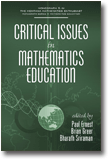
Critical Issues in Mathematics Education
Edited by:
Paul Ernest, University of Exeter, UK
Brian Greer, Portland State University
Bharath Sriraman, University of Montana
A volume in the series: The Montana Mathematics Enthusiast. Editor(s): Bharath Sriraman, University of Montana.
Published 2009
The word "critical" in the title of this collection has three meanings, all of which are relevant. One meaning, as applied to a situation or problem, is "at a point of crisis". A second meaning is "expressing adverse or disapproving comments or judgments". A third is related to the verb "to critique", meaning "to analyze the merits and faults of". The authors contributing to this book pose challenging questions, from multiple perspectives, about the roles of mathematics in society and the implications for education. Traditional reasons for teaching mathematics include: preparing a new generation of mathematics researchers and a cadre of technically competent users of mathematics; training students to think logically; and because mathematics is as much part of cultural heritage as literature or music. These reasons remain valid, though open to critique, but a deeper analysis is required that recognizes the roles of mathematics in framing many aspects of contemporary society, that will connect mathematics education to the lived experiences of students, their communities, and society in general, and that acknowledges the global ethical responsibilities of mathematicians and mathematics educators.
The book is organized in four sections (1) Mathematics education: For what and why? (2) Globalization and cultural diversity, (3) Mathematics, education, and society and (4) Social justice in, and through, mathematics education
The chapters address fundamental issues such as the relevance of school mathematics in people's lives; creating a sense of agency for the field of mathematics education, and redefining the relationship between mathematics as discipline, mathematics as school subject and mathematics as part of people's lives.
CONTENTS
Section 1: Mathematics education: For what and why? Brian Greer • What is mathematics education for? Bill Atweh • Ethical responsibility and the "What" and "Why" of mathematics education in a global context Uwe Gellert & Eva Jablonka • The demathematising effect of technology: Calling for critical competence Mellony Graven & Hamsa Venkat • Mathematical literacy: Issues of engagement from the South African experience of curriculum implementation Cecilia Agudelo-Valderrama • The purpose of school mathematics: Perspectives of Colombian mathematics teachers Roza Leikin • Teaching mathematics with and for creativity: An intercultural perspective Fiona Walls • Whose mathematics education? Mathematical discourses as cultural matricide? Alexandre Pais • The tension between what mathematics education should be for and what it is actually for Monica Mesquita • Mathematics education: For whom? Section 2: Globalization and cultural diversity Paul Ernest • Mathematics education ideologies and globalization Bill Atweh • What is this thing called social justice and what does it have to do with us in the context of globalization Bal Chandra Luitel & Peter Charles Taylor • Defrosting and re-frosting the ideology of pure mathematics: An infusion of Eastern-Western perspectives on conceptualizing a socially just mathematics education Gelsa Knijnik • Mathematics education and the Brazilian landless movement Dennis Almeida & George Gheverghese Joseph • Kerala mathematics and its possible transmission to Europe Paul Ernest • The philosophy of mathematics, values, and Kerala mathematics Section 3: Mathematics, education, and society Paul Ernest • Classroom Research: Impact and Long Term Effect versus Justice, Liberation and Empowerment? Simon Goodchild • Values and the social responsibility of mathematics Paola Valero • What has power got to do with mathematics education? Ole Skovsmose • Mathematics in action Ole Skovsmose & Keiko Yasukawa • Formatting power of mathematics Paul Budnik • What is mathematics about? Philip Davis • Applied mathematics as social contract De Freitas • Mathematics and curriculum integration: Challenging the hierarchy of school knowledge Section 4: Social justice in, and through, mathematics education Bharath Sriraman & Olof Steinthorsdottir • Social justice and mathematics education: Issues, dilemmas, excellence and equity Kurt Stemhagen • Social justice and mathematics: Rethinking the nature and purposes of school mathematics Eric (Rico) Gutstein • Possibilities and challenges in teaching mathematics for social justice Peter Applebaum & Erica Davila • Math education and social justice: Gatekeepers, politics, and teacher agency Jeff Evans • On methodologies of research into gender and other equity questions Carol V. Livingston • The privilege of pedagogical capital: A framework for understanding scholastic success in mathematics Kwame E. Glevey • Pupils of African heritage, mathematics education, and social justice Renuka Vithal • Researching, and learning mathematics at the margin
-
Paperback978-1-60752-039-9
Web price: $62.04 (Reg. 72.99)
-
Hardcover978-1-60752-040-5
Web price: $89.24 (Reg. 104.99)
- eBook9781607522188

- MAT030000 - MATHEMATICS: Study & Teaching
- EDU029010 - EDUCATION: TEACHING METHODS & MATERIALS: Mathematics
- EDU037000 - EDUCATION: Research
-
 Critique as Uncertainty
Critique as Uncertainty
-
 Crossroads in the History of Mathematics and Mathematics Education
Crossroads in the History of Mathematics and Mathematics Education
-
 Interdisciplinarity for the 21st Century
Proceedings of the 3rd International Symposium on Mathematics and its connections to the Arts and Sciences, Moncton 2009
Interdisciplinarity for the 21st Century
Proceedings of the 3rd International Symposium on Mathematics and its connections to the Arts and Sciences, Moncton 2009
-
 Selected writings from the Journal of the British Columbia Association of Mathematics Teachers
Celebrating 50 years of Vector
Selected writings from the Journal of the British Columbia Association of Mathematics Teachers
Celebrating 50 years of Vector
-
 Selected writings from the Journal of the Mathematics Council of the Alberta Teachers' Association
Celebrating 50 years (1962-2012) of delta-K
Selected writings from the Journal of the Mathematics Council of the Alberta Teachers' Association
Celebrating 50 years (1962-2012) of delta-K
-
 Selected Writings from the Journal of the Saskatchewan Mathematics Teachers' Society
Celebrating 50 years (1961-2011) of Vinculum
Selected Writings from the Journal of the Saskatchewan Mathematics Teachers' Society
Celebrating 50 years (1961-2011) of Vinculum
-
 The Development of Teaching Expertise from an International Perspective
The Development of Teaching Expertise from an International Perspective

